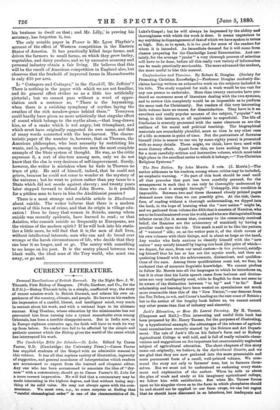The New Nation. By John Morris. 5 vols. (J. Morris.)—The
author addresses to his readers, among whom critics may be included, an emphatic warning. "No part of this book should be read until all that precedes that part has been carefully perused, for the arrangement is such that it can only be thoroughly understood by those who read it straight through." Unhappily, this condition is impossible. Between two and three thousand closely printed pages demand more time than we can possibly give. At the risk, there. fore, of reading without a thorough understanding, we dipped into the book, in the hope of learning what the "new nation" might be, and we gathered from volume the fifth that it consists of Hamites, who are to be found scattered over the world, and who are distinguished from inferior races (for it seems that, contrary to the commonly received belief, the Hamites are the aristocracy of mankind) by having a peculiar mark upon the hip. This mark is said to be like the pattern of " watered " silk; or, as the writer puts it, of the cloth covers of his own volumes with their linings, and is about as large as the hand. Any reader who feels anxious to identify himself with the "new nation" may satisfy himself by buying this book (the price of which— we depart, for once, from our usual custom—is two guineas), satisfy- ing himself that he has or has not the mystic mark, and then ac- quainting himself with the achievements, distinctions, and qualifica- tions of the race. Among these qualifications must not, we fear, be reckoned that of accurate linguistic knowledge. We cannot profess to follow Mr. Morris into all the languages to which he introduoes 114 but it is clear that his Latin speech came from lexicons and diction- aries not very intelligently used, while in English he does not seem to be aware of the distinction between "to lay" and "to lie." Real scholarship and learning have been wasted on speculations not much more reasonable than this of the "New Nation,"—our descent from the Ten Tribes, to wit, and Caesar's landing on the east coast of Britain ; but to the author of the lengthy book before us, we cannot accord any other praise than that of industry and sincerity.


































 Previous page
Previous page